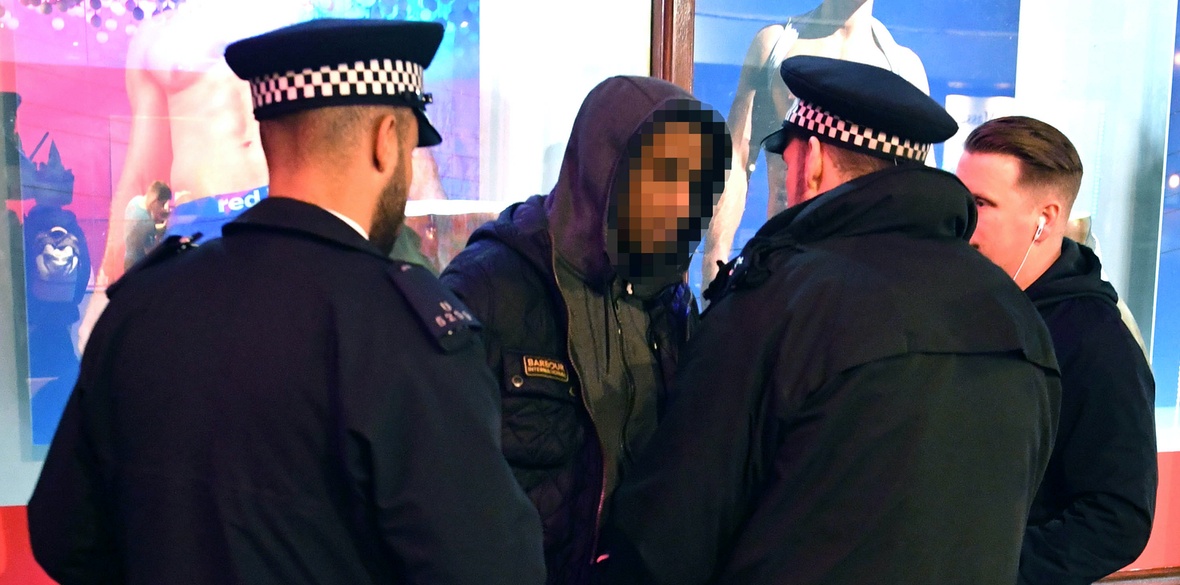This is the last article you can read this month
You can read more article this month
You can read more articles this month
Sorry your limit is up for this month
Reset on:
Please help support the Morning Star by subscribing here
TO BE black in Britain is to suffer the indignity and near certainty of a “stop-and-search” encounter with the police.
The official statistics won’t capture every incident, but they do show that the police carried out 54 stops for every 1,000 black people in the year 2019-20.
The Metropolitan Police topped the league table, with over 70 incidents per 1,000, but Merseyside was not far behind with about 65.
There were six stop and searches for every 1,000 white people in the same period.
One in four young black men in London, who were not actually committing a crime, were stopped in the period studied.
These figures, which come as no surprise whatsoever to the people who experience this exercise in arbitrary police power, come also as no surprise to the police force itself.
From the parliamentary home affairs committee there arrives the conclusion that these failings are systemic and are expressed as “unjustified inequalities” and “deep-rooted and persistent disparities.”
The report concludes that such racism cannot be explained or justified.
It is true that this cannot be justified but it can be explained. By racism. But by a racism that is deeply embedded in a criminal justice system that is suffused with the bias and discrimination that comes as standard in class society.
Police and crime statistics are a real growth industry. There is almost no other emanation of the coercive state that is more dedicated to collecting facts and figures.
One feature of policing statistical exercises is that they measure more what the police see as priorities and police activity rather than the full spectrum of crime.
When the figures show that stop and search has little utility in detecting or solving crime, the question that naturally arises is — what might be a fruitful kind of activity for the police?
Contemporary figures for white-collar crime are rather elusive but the statistics show that the number of reported offences increased by 4 per cent to 641,539 in 2016, up from 617,112 in 2015.
That is a rather serious rise for this category of crime. The prosecution rate was 1.3 per cent. And not all prosecutions were successful.
It is to the Financial Times — the official organ of the plutocracy — that we must turn for a straightforward explanation.
“Since the financial crisis,” it reports, “the workings of white-collar crime and punishment have been out of kilter. Crimes in the financial sector have continued — witness scandals over the rigging of Libor interest rates, money laundering, customer rip-offs and the rest.
“But punishment has been largely confined to companies, not top executives, with innocent shareholders picking up the bills for huge fines imposed by the judicial authorities.”
Set aside the problematic concept of “innocent shareholders” and we have the reality of crime and policing in capitalist Britain.
A massive, intrusive and unjustified police presence in the daily lives of black people who — in Britain’s highly stratified class society mostly can be found in the working class — combined with a desultory approach to serious financial crimes.
The politics of policing demonstrates the truth that all politics is framed in the language of priorities.
We can set aside the idea that crime fighting, or rather the detection of crime, is a successful enterprise or that the police are very effective.
According to Home Office figures, the proportion of crimes solved by police in England and Wales in 2019 fell to the lowest level recorded. Under one in 12 offences resulted in someone being charged or summonsed.
There must be other reasons for the way Britain is policed.











